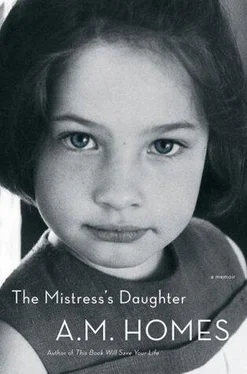I was carried down the hall and laid out on the big bed in my parents’ room. Neighbors, the aunts and uncles, all came to look at me; a prize — the most beautiful baby they’d ever seen. My hair was thick and black and stood up like a rocket ship, my eyes were bright blue. “Your cheeks were luscious and pink — we ate you up. You were perfect.”
Think of the differences in anticipation; with a non-adopted baby, members of the family would have visited the hospital. They would have seen me with my mother, or visited me in the nursery, picking me out from the police lineup of bassinets.
But here it begins with a phone call: Your package has arrived and is wrapped in pink ribbons. The trusted pediatrician dispatched to the hospital to make an evaluation of the merchandise — think of movies where the drug dealer samples the stuff before turning over the cash. There is something inescapably sordid about the way the story unfolds. I was adopted, purchased, ordered, and picked up like a cake from a bakery.
When I was twenty my mother confessed that the “friend” who collected me was the next-door neighbor. I couldn’t believe that all these years, I had lived next door to someone who had seen my mother, who had actually met her face-to-face.
I dialed the neighbor’s house. “So?” I said. “You saw my mother?” The neighbor was cautious. “I hope you’re not going to do something about this,” she said. “I hope you’re not going to pursue it.” It amazed me that this was the reaction. What was her fear? That I would disrupt my family, the woman’s family, that I would wreak havoc? What about me, my life, the deep chaos that had been my existence?
“What did she look like?”
“She was beautiful. She had on a tweed suit and I couldn’t believe that she had just had a baby. She didn’t look pregnant at all. She was thin. And her hair was up in a bun.”
I pictured Audrey Hepburn.
“Did she look like me?”
I can’t remember what the neighbor said. I was suffering the deafness that comes in moments of great importance.
“I wore bad clothing,” the neighbor was telling me. “I disguised myself. I didn’t want her to know anything. And she too was very concerned about anyone knowing who she was.”
The amount of mystery that surrounded the proceedings was enormous, everything was subtext and secrecy. Beneath the intrigue was the element of shame that no one ever talked about.
“‘If you ever see me, don’t acknowledge me,’ the woman said. Meaning that if I ever saw her at a party or around town, I should pretend that I didn’t know her,” the neighbor told me.
“Did you ever see her again?”
“No, I never saw her again.”
“If you ever see me, don’t acknowledge me.” The one line of dialogue, the only direct quote.
In the morning my mother comes into my room with a scrap of paper; she sits at the edge of my bed and asks me again, “Do you want the name?”
I don’t answer. Even if I want it, I can’t say so — it feels like a betrayal.
“It’s the same name as a friend of yours,” she says, as if she were trying to warm it up, to detoxify it, to make it somehow more palatable. “I think she has a brother, a lawyer who lives in the area — Frosh recognized the name.”
“You can just leave it on the desk,” I say. Her name is Ellen. Ellen Ballman. It sounds like a fake name. Ball-man. What is she like? What does she do? Is she smart?
I once met an adopted woman whose mother had come back and found her. The mother was a photographer who traveled a lot. She was lovely, warm, respectful. She said, “I just want you to know I’m here if you need me.”
Ellen has a brother who lives in the area, my mother had said. I look up the brother’s address. I go for a ride. I am trying it on — the concept of biological family. His house is on my regular route. As a habit, I drive to think, I drive the way other people jog. I have a regular routine, landmarks. I have been riding up and down this road for years, fixated on the roll of the hills, the long driveways — how strange that my uncle’s house is just a left turn away.
White brick, lots of cars, a basketball hoop in the driveway — a sore point. As a kid the thing I wanted most was a hoop. A hundred times a year I asked for one — and my parents, entirely unathletic, would say no. A hoop would ruin the aesthetic integrity of the house. I played next door, I played up the street, I played until inevitably someone would stick their head out a window and suggest I go home for dinner.
I park outside the uncle’s house; this is the first time I’ve been within feet of someone biologically connected to me. I sit and imagine them inside, the uncle and his sons, my cousins. The Christmas decorations are up. I see their tree through the window. I imagine this as a joyous, prosperous place. I imagine they are somehow better than me — I drive away.
I call a private investigator, the friend of a friend — also adopted. I give her what little information I have.
“Give me a couple of hours,” she says.
I am a spy, a hunter, hot on the trail. I have no idea what I’m doing except that I want information, something to go on before I proceed. I don’t want any more surprises.
The P.I. calls me back.
“The woman you’re looking for doesn’t have a phone listed in her name in New Jersey. And she doesn’t have a local driver’s license, but she does own a home in the Washington area.”
The P.I. gives me the address. I get back in the car. It’s nearby, very nearby. Did she really live that close? Has she lived there all along? Might I have seen her somewhere without knowing it — in a shopping mall, or a restaurant? I circle the house. It looks empty. I park, knock on a neighbor’s door — asking questions, talking to strangers. What is a stranger? Who is a stranger? She could well be my mother.
“Do you know what happened to the folks next door? Moved? Any idea where to?” Dead end.
I go to the library of my childhood, of book reports and science projects. I look things up. I am always looking things up. I get a map of the town in New Jersey where she lives, I find her street. I look in phone books, call information. Nothing. Why is she not listed? Does she live with someone? Does she have another name? Is she a liar? An outlaw?
I call Frosh, the lawyer. “A letter. I’d like a letter,” I say. “I want information — where she grew up, how educated she is, what she does for a living, what the family medical history is, and what the circumstances of my adoption were.”
I am asking for the story of my life. There is an urgency to my request; I feel as if I should hurry and ask everything I want to know. As suddenly as she has arrived, she could be gone again.
As soon as I hang up, I start waiting for the letter.
Ten days later, her letter arrives with no fanfare. The postman doesn’t come running down the street, screaming, “It’s here, it’s here! Your identity has arrived.” It comes in an envelope from the lawyer’s office with a scrawled note from the lawyer apologizing for not having got it to me sooner. It’s clear that the letter has been opened, presumably read. Why? Is nothing private? I am annoyed but don’t say anything. I don’t feel I have the right. It’s one of the pathological complications of adoption — adoptees don’t really have rights, their lives are about supporting the secrets, the needs and desires of others.
The letter is typed on her stationery, simple small gray sheets of paper, her name embossed across the top. Her language is oddly formal, less than artful, grammatically flawed. I read it simultaneously fast and slow, wanting to take it in, unable to take it in. I read it and then read it again. What is she telling me?
Читать дальше












